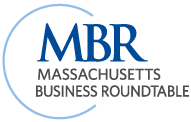A Talent Agenda to Drive Massachusetts Competitiveness
The secret to Massachusetts’ economic success has historically been its ever-growing population of well-trained, highly educated, and diverse talent. For decades, this has been the Commonwealth’s greatest competitive advantage…and will continue to be. However, this economic strength is currently under threat due to three key challenges, namely: the high cost of living; the outmigration of talent; and the high costs of doing business in the Commonwealth.
To address these challenges, the Roundtable has developed an updated “Talent Agenda to Drive Massachusetts Competitiveness.” It builds upon the original version, released in the Fall of 2021 in collaboration with the Center for State Policy Analysis at Tufts University, which was then updated in the Fall of 2022. As a member-driven organization, this latest update integrates feedback from Roundtable members and includes new survey data, statistics, and recommendations with the intent to serve as the Roundtable’s public policy framework for the 2025–2026 legislative session.
The policies outlined in the Talent Agenda are based on three pillars: Attracting and Retaining Talent; Developing Untapped and Diverse Talent; and Creating a Competitive Environment for Growth. Within each of these pillars are specific strategies, key areas of focus, and action-oriented, collaborative solutions to address the state’s core challenges.
We have elevated our focus on growth and economic competitiveness by establishing a pillar solely dedicated to it. In it, we address important questions about how to better align the state’s workforce pipeline and economic development strategies, how to continue to support investments and grow emerging industries, and how to collaborate in the implementation of significant legislation from the last session addressing housing and economic development. At the same time, we will continue to advocate for policies that lower the cost of doing business, particularly in areas such as energy, health care, and regulatory compliance, while advocating for tax policies that support a more competitive business climate.
Throughout the Talent Agenda, we tackle initiatives new this year, such as how to better tell the Commonwealth’s story, how to grow skills-first talent strategies across industries statewide, and how to integrate housing, transportation, and workforce policy more holistically. We will also continue to focus on areas where we have led in the past, such as connecting employers to diverse talent pipelines, supporting caregiving and caregivers in the workplace, and expanding career opportunities for immigrants.
By focusing on policies that make the Commonwealth an inclusive, affordable, and competitive place for workers, residents, and businesses to call home, we can solidify Massachusetts’ greatest competitive advantage—its talent—and position the state to better compete in a fast-changing and global economy.
RECENT POSTS
- No Borders: Climate Change, A Call to Action for All
- Celebrating Diversity
- A Talent Agenda to Drive Massachusetts Competitiveness
- Taking Aim at the State’s Competitiveness
- Bentley and Roundtable Gather Executives To Discuss How Business Impacts Society
- Quarterly Policy Roundup: Q2 2024
- What We Learned on Our Trip to D.C.
- Conversations with Business Leaders: Navigating the Challenges Impacting Growth in Massachusetts
- Quarterly Policy Roundup: Q1 2024
- Black History Month: Reflections from Roundtable Staff
